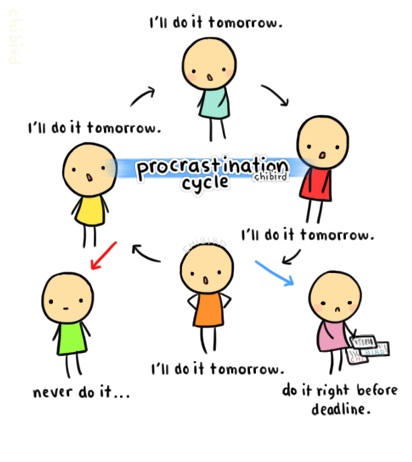
Do you find yourself waiting for the perfect time to start a task, but that moment never seems to come by? Do you tend to put tasks off believing that there will be enough time later but somehow end up rushing to finish it and being disappointed at the end result? If you find yourself consistently living at this edge, chances are you might be a procrastinator. While procrastination is very natural and common, in most people who are gripped by it, it causes a lot of distress and dissatisfaction.
Here are some tips that help to get out of the procrastination funk.
1.Try to re frame the way you see the task at hand.
Research has found that procrastination is linked to a difficulty in managing distress. When a task is perceived as unpleasant and distressing then, procrastinators engage in task aversion as a way of avoiding the distress associated with the task. Ironically, procrastination inherently causes even more distress in the long run, but we fail to see this as the focus becomes to avoid any distress in the present. Thus, a handy way to avoid procrastination is to try and change the way in which you view the task. Instead of thinking of it as boring, tough and such, try and re frame the task as challenging but exciting or in other such positive ways.
2. Focus on “why” you are doing what you are doing.
Procrastinators tend to be more focused on present gratification rather than future, long term goal achievement. Short term rewards like avoiding the unpleasant task are seen while long term consequences like increased stress, decreased performance are actively ignored. In this case it helps to take a step back and think about why you are doing something. Reinforcing why the task needs to be done, reminding yourself of why you are doing something at present to avoid the task, and focusing on long term benefits of completing the task are all helpful to motivate yourself to get the task done.
3. Be organised
Often times with procrastination, people say things like “I will start the task when I have more time”, but fail to actually make time for these tasks. Breaking complicated tasks down to smaller goals and allocating time for accomplishing each goal, helps you be more specific about when a certain thing needs to be done. This helps make the task less overwhelming and it feels more achievable. Having a schedule and following it also helps stay motivated as each small accomplishment comes with increased self-esteem, which is essential to sustain motivation.
4. Be realistic.
When making a schedule and thinking about the task at hand, try to be as realistic as possible. Procrastinators find themselves believing that they will have more time later, or they tend to disregard possible obstacles that might occur in the future. Thus, try to be as realistic as possible and give yourself enough time to be able to finish the task. Also, try to recognize possible obstacles and work around those. For example, if you aren’t a morning person then don’t expect yourself to wake up early and finish the task. Instead prepare a schedule that plays to your strengths and is as easy as possible to carry out.
5. Optimize your environment.
Your environment can help or hinder your productivity. Create an environment that will be conducive to finishing the task at hand. For example, keeping things like your phone which are distracting away from the work environment helps stay on the task at hand.
6. Acknowledge and reward small accomplishments.
An important aspect of getting any task done, is to sustain motivation. Thus, rewarding yourself for small accomplishments regarding the task at hand, helps maintain motivation to complete the task. So instead of using certain tasks as distractions to procrastinate, make them incentives for actually accomplishing small goals.
7. Be compassionate and forgiving with yourself
Perfectionism is often linked with procrastination. Procrastinators find themselves waiting for the perfect time or inspiration to get the task done and have very high expectations from the results. While this can be useful, it also detrimental effects as they end up feeling pressured and overwhelmed at the prospect of producing work that doesn’t meet their perfectionist standards. Thus, they fall into a loop of procrastination to avoid the distressing task which is further reinforced by self-defeating and berating thoughts like, “I should have started earlier” or “I always procrastinate; I am such a loser”. Self compassion and forgiveness is essential in breaking this vicious loop. By forgiving yourself for past mistakes and developing compassion for yourself, you will be able to give yourself the space to actually get down to doing the task even if it isn’t perfect in the first go.
Finally, it is important to acknowledge that procrastination is normal and it is human to want to put off tasks that are difficult or unpleasant. If you are able to acknowledge and accept why and how you procrastinate, it is a great first step to actively deal with it and develop your own techniques to get work done.
This article is written by our Counselor-Pooja Agarwal.
